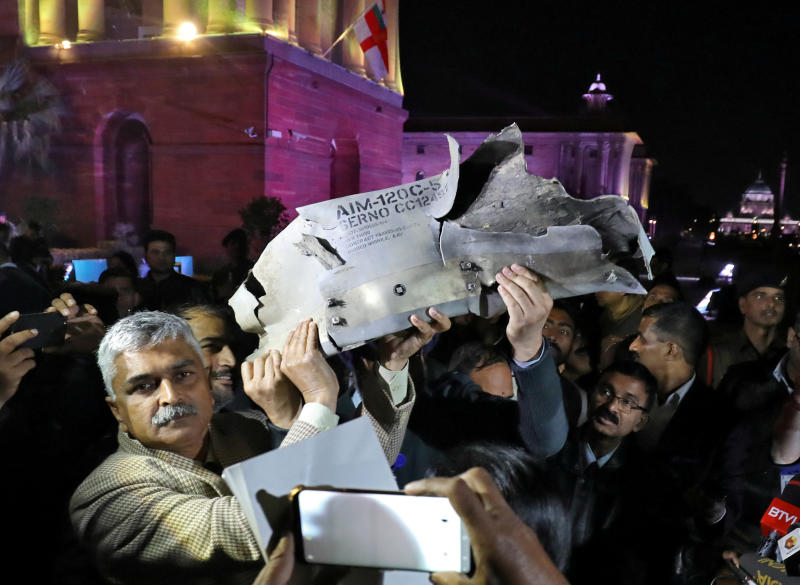Air strikes against Pakistan dominate political discourse in India as election draws near
Sign up now: Get ST's newsletters delivered to your inbox

Indian Air Force officials display a wreckage of AMRAAM air-to-air missile that they say was fired by Pakistan Air Force fighter jet during a strike over Kashmir, in New Delhi on Feb 28, 2019.
PHOTO: REUTERS
Follow topic:
NEW DELHI - The air strikes against Pakistan continued to dominate the political discourse in India as the ruling and opposition parties took potshots at each other over different issues, in what some media labelled as "strike politics''.
Air Chief Marshal Birender Singh Dhanoa confirmed on Monday (March 4) that Indian Air Force planes had hit terrorist training camps belonging to Jaish-e-Mohammed (JeM), but maintained that it was not in a position to count the number of terrorists killed.
His comment comes as the death toll, among others, turned into political fodder in a high-stakes battle for a win in the election due within two months.
India had said earlier that the strikes eliminated large numbers of militants, but provided no proof.
Prime Minister Narendra Modi has accused the opposition of demoralising the armed forces by "raising doubts" about the air strikes.
"It is natural that we all should believe the armed forces and be proud of the forces. Yet, I don't understand why some people still want to question the forces,'' Mr Modi tweeted on Monday.
He also reiterated for the second day that the outcome would have been different if India possessed Rafale jets, which are French-made medium multi-role combat aircraft. He noted that with Rafale jets, no Indian fighter jet would have gone down.
India has ordered 36 Rafale jets costing US$8.9 billion (S$12 billion) from French firm Dassault Aviation. The jets would be inducted into the air force in September this year.
The Bharatiya Janata Party (BJP) has accused the previous Congress government of delaying the acquisition. But Congress president Rahul Gandhi has been attacking Mr Modi over the deal, calling it corruption because of the cost and the choice of a private business firm over a state firm.
Congress spokesman Manish Tewari said during a press conference on Sunday: "The prime minister has himself questioned the air strike. He said had the Rafale jets been there (with the Indian Air Force), the results would have been different. What is the meaning of this?"
The Indian Air Force targeted the JeM training camps deep within Pakistan last Tuesday in retaliation for a suicide bombing in Kashmir which killed 40 paramilitary police officers on Feb 14.
Pakistan responded with a counter strike within Indian territory, resulting in a dogfight between the two air forces and the capture of Indian pilot Abhinandan Varthaman, who was released last Friday as a goodwill gesture to ease tensions.
At a rally, BJP president Amit Shah maintained that India had killed more than 250 terrorists, with the Trinamool Congress accusing BJP ministers of "leaking exaggerated numbers" to the media.
Congress leader Navjoy Singh Sidhu, who is known for his outspokenness, tweeted: "300 terrorist (sic) dead, Yes or No? What was the purpose then? Were you uprooting terrorist or trees? Was it an election gimmick?''
Mr Modi is going into the elections a popular leader but has been laid low by a series of issues - from distress in the farm sector where farmers have been demanding higher prices for their produce and loan waivers, to the problem of unemployment with jobs not matching the millions joining the workforce.
The BJP, which is trying to re-create the landslide win in 2014 in which it won 282 of the 543 seats in the lower house of Parliament, was hit by its worst electoral loss in December in its stronghold states of Rajasthan, Madhya Pradesh and Chhattisgarh.
Analysts said the air strikes against Pakistan would continue to dominate the political discourse as parties attempt to woo voters to their point of view.
"It is going to be one of the most acerbic name-calling elections. The ruling party is trying to project that the opposition is speaking like Pakistan. The opposition is saying the ruling party can't take monopoly over these issues (of patriotism and national security)," said Dr Sandeep Shastri, a political analyst and pro-vice-chancellor of Jain University.
He added that the BJP had an advantage for now. "People were angry and wanted concrete action (against Pakistan) and supported the air strikes but subsequent to that, the common people are not sure if enough was done.''
Dr N. Bhaskara Rao of the Centre for Media Studies said: "This is a fight for votes and its going favourably for the incumbent so far. But still there is time left. Anything can happen.''

